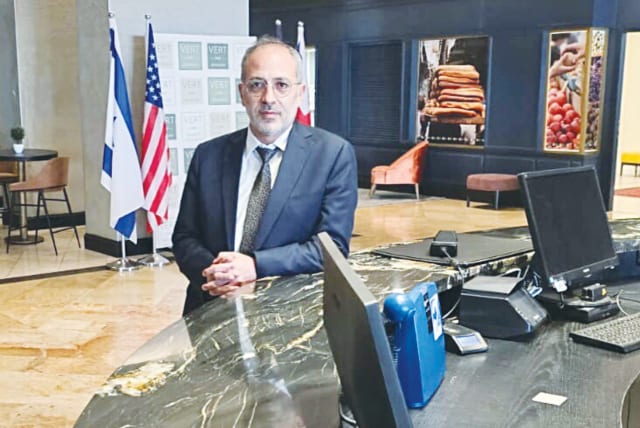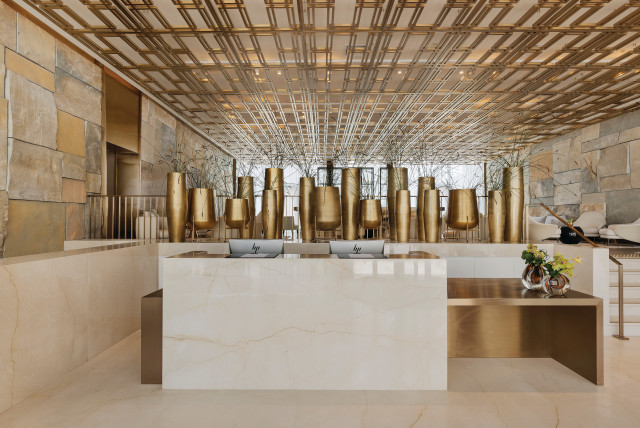The saga of hotels’ late Shabbat and holiday checkout

Why do hotel guests, some of them wealthy, accept the procedure of paying for late check-out abroad, but expect it gratis in Israel?
Whether on a vacation or a business trip, the last day in a hotel can be challenging. How many of us have overslept to be woken on this last day of our trip by reception calling to ask when we plan to depart? Whether accidental or planned, late check-out is often requested by guests when they want to stay past the set check-out time. However, hotel staff, especially during peak season, is under enormous pressure to have housekeeping prepare rooms for guests who might already be waiting in the lobby due to an early flight.
Hotels and customers alike tend to agree that there is a need for a late checkout surcharge for those wishing to keep their rooms beyond the standard 11 a.m. or 12 p.m. check-out time. The fee is added to the nightly rate to cover the cost of a guest staying past the check-out time and potentially incurring overtime cleaning charges and inconvenience involved in readying the room for the next guest.
Late check-out times are not the same in all hotels. The time available varies among establishments, and the rates for this service may differ depending on the hotel and the season. Some hotels may not even offer late check-out service. It is always recommended to confirm with the hotel before booking if this is a service you require.
Global brands are aware of this common need and include benefits for their loyalty program members. Some Marriott Bonvoy members may enjoy late check-out based on availability. Certain Hilton Honors members are aware they may receive complimentary late check-out, upon availability. IHG One Rewards Club members, and the InterContinental Hotels Group offer a late check-out at 2 p.m. however upon member request and subject to availability.
Obviously a very careful policy and not generous perks, as the housekeeping challenges are not simple ones. Ever since COVID, the hospitality industry is suffering from a never-ending labor shortage.
Israel, the exception
With this reality in mind, Israel stands out as an exception.
An ongoing demand is growing among politicians and customers, urging hotels to grant complimentary late checkout on Shabbats and Jewish holidays, particularly in peak season when the sun sets after 7 p.m.
“There are hotels that do not allow late check-out on Shabbat and a religious person will have to find a solution to store his belongings,” Knesset member Erez Malul (Shas) recently wrote to Tourism Minister Haim Katz.
“I call upon the honorable minister to address the issue and act to change the relevant regulations in this matter, in order to bring the various needs into balance so that at the very least it will be emphasized to those coming to stay at the hotels what the check-out policy is, and it is appropriate that a solution will be provided, if possible, for the Sabbath-observant to stay at the hotel until the end of Shabbat.”
Previous to the COVID pandemic, Knesset member Miki Zohar (Likud), now the Culture and Sport minister, launched his own initiative as head of the Committee for Distributive Justice.
“The committee will address the Tourism minister and the Hotel Association with a request to conduct a renewed examination, and hold a joint discussion with all the CEOs of the hotels, regarding the committee’s recommendations regarding the check-in time on Friday and the check-out time on Saturday and allow two-thirds of the population of the State of Israel to rest and observe the Sabbath properly,” he said at the conclusion of the meeting.
In reality, most of Israel’s rural lodgings, hostels, camping, glamping, and short-term rentals (houses, villas, condos, and apartments), are granting complimentary late checkout on Saturdays and holidays. The management of these lodgings is generous because it is aware of demand, and knows that practically no new customers will arrive in the evening after these guests leave. On the other hand, luxury and deluxe hotels rely on foreign travelers and can expect arrivals at any hour, so these Knesset members are aiming high when looking for reform in the law.
One question remains. Why do hotel guests, some of them wealthy, accept the procedure of paying for late check-out abroad, but expect it gratis in Israel?
IT’S IMPORTANT to get the facts right. Most Israeli hotels are kosher certified with constant Chief Rabbinate supervision. While such certification is not compulsory, “Travelers to Israel, especially if they are Jewish and choose a hotel with kosher certification, believe they are staying in a place that reflects the nature of the country”, says Eli Havlin, a former advisor to Israel’s Chief Rabbi. “Observing Shabbat and the High Holidays is part of the kosher expectations, and this includes checking out after sunset on Shabbat. I believe it’s legitimate for hotels to be compensated in a decent way for this service. The hotels that do offer this benefit without a charge are doing it as a marketing stunt, in order to attract religious customers and they don’t regret it”, he says.
One of these hotels is the luxurious Waldorf Astoria Jerusalem. General manager Avner On says that his weekend market is definitely the religious ultra-Orthodox.
“Providing a complementary generous late checkout on Shabbat and the High Holidays is extremely successful, as the hotel is almost full every Friday. Guests are aware of this policy and many Jewish Americans will specifically target a stay with us on the weekend, departing straight to the airport for the night flights to the US,” he says. On’s voice is courageous, as most hoteliers preferred to stay anonymous when asked about their strategy. The magic words “upon availability,” “depends on the season or circumstances” are used never used here.
Israeli tourism expert, Joseph Fischer, with 40 years of lodging experience working for leading international brands, clarifies how challenging the situation is for hoteliers.
“Resorts in Israel rely on group business with the organizers conditioning the agreement with a late checkout on Shabbat. It’s a yes or no and the hotels, most times, will approve, otherwise another hotel will host the group. Business and boutique hotels hardly work with these types of customers and [for them] the late checkout is conditioned by an additional fee. This will not change with the current political environment,” he says. Clearly, this anomaly creates conflicting views and complicated reality.
Yael Danieli CEO Hotel Association in Israel (with around 450 member hotels) explains in her letter to MK Malul that she is prohibited from interfering in, or recommending hotels to take, any commercial decisions, including policies regarding hotel-room departure times on weekends.
“Checkout policy varies from hotel to hotel, depending on commercial circumstances, seasons, occupancy, type of clients – and so does whether to charge a fee for late departure. The association is prohibited from interfering in the matter or making any recommendations. However, we do praise hotels’ publication of their policies and hours regarding the vacating of rooms on the weekend,” she says.
Malul says he still hopes “a solution for the additional charge for the late checkout will be found”, he says. With Rosh Hashanah, Yom Kippur, Sukkot and Simchat Torah approaching, Israeli hotel receptionists are polishing their shields for the inevitable late check-out requests and demands. The creative hoteliers have already found the magic remedy. Accommodation is offered for a minimum of two nights stay (or more) until the conclusion of the relevant holiday. Problem solved.
The writer is the Travel Flash Tips publisher.
Jerusalem Post Store
`; document.getElementById("linkPremium").innerHTML = cont; var divWithLink = document.getElementById("premium-link"); if (divWithLink !== null && divWithLink !== 'undefined') { divWithLink.style.border = "solid 1px #cb0f3e"; divWithLink.style.textAlign = "center"; divWithLink.style.marginBottom = "15px"; divWithLink.style.marginTop = "15px"; divWithLink.style.width = "100%"; divWithLink.style.backgroundColor = "#122952"; divWithLink.style.color = "#ffffff"; divWithLink.style.lineHeight = "1.5"; } } (function (v, i) { });

